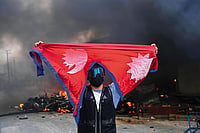Even before our memories could fade out the smile of the child who came out of the rubbles after more than 72 hours of struggle in devastated Turkey, another earthquake of 6.4 magnitude hit the country yesterday night killing three and injuring hundreds. The new tremors only added to the continued mounds of debris and discarded furniture that lined the dark, abandoned streets. This time, it was centred near the southern Turkish city of Antakya and was felt in Syria, Egypt and Lebanon. It was followed by a second, 5.8-magnitude tremor.
The previous earthquake on February 6 of 7.8 magnitude took away more than 45,000 lives and forced the people into unprecedented despair and uncertainty while leaving behind 6,000-plus tremors.
Also Read | Writing Disaster
Though this time the destruction in terms of quantifiable numbers is less, debris is everywhere on the streets and on the foothills of the snow-capped mountains. People have stopped crying and, amid the foul smell of rotting corpses, can be seen pleading with rescue teams to retrieve the bodies of their loved ones.
With the death toll still mounting, many countries, including India, have offered aid and dispatched rescue teams to affected areas. In the freezing cold, volunteers are working against time to rescue people and animals trapped under the rubble. Millions are awaiting aid while camping out in makeshift shelters, too afraid to re-enter their damaged homes.
The disaster is a double blow to Syrian refugees in Turkey, who are having to re-live the trauma of war in their homeland. Scenes that vacillate between hope and heartbreak are playing out across affected areas, with children and seniors bearing the fatal brunt of the disaster. As temperatures continue to dip in both countries, so will the number of survivors rescued, say experts.

An earthquake—a natural hazard—becomes a disaster when people build homes, infrastructure and assets for their livelihoods without conforming to seismic safe building codes. But once they fall like a pack of cards, how does one begin in the aftermath of another disaster that brings back the trauma and the despair of the disasters, one witnessed or was part of, directly or indirectly? But as journalists, how are we supposed to perceive it? Outlook editor Chinki Sinha rightly asks, how to write a disaster? Is it about merely the numbers or are there memories lying beneath the rubbles?
Also Read | There Are No Natural Disasters
In this backdrop, Outlook’s latest issue, 'Deliver Us From Greed’, looks at how climate change, poor planning and mindless construction leads to catastrophic ‘natural’ disasters which are marked by greed and arrogance.
Through the issue, we sew stories that talk of grief, pain and helplessness. We search for the people rebuilding their homes --- at what cost no one knows. We talk of historical and cultural edifices becoming collateral damage. We talk of reminder that time and aid are of the essence, as are solidarity, compassion and political acumen.
Disaster has a long history. And we have a short future if we do not realise that history is political.
Chinki Sinha's words perhaps give us a brief to think through- "We forget the lessons. We forget to follow up, to look at disaster as a continuum…It is marked by greed and arrogance. It is where we witness segregation. Not just its arrival but its aftermath. In the forgetfulness and in the silence. In the possibility and the impossibility... This is my way of writing disaster.”





















